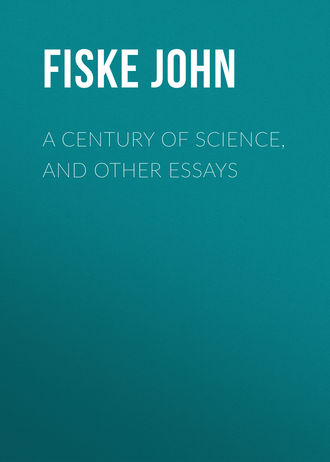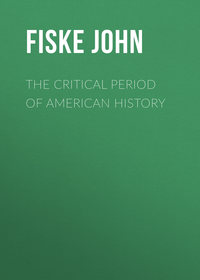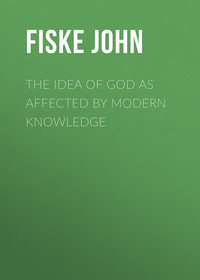 полная версия
полная версияA Century of Science, and Other Essays
People who prefer civilized and gentleman-like methods of settling disputes to the savage and ruffian-like business of burning and slaughtering are sometimes stigmatized by silly writers as "sentimentalists." In the deliberate public opinion which has come to be so strong a force in preventing war between the United States and Great Britain, sentiment has as yet probably no great place; but it is hoped and believed that it will by and by have much more. In the days of Alexander Hamilton, there was very little love for the Federal Union in any part of this country; it was accepted as a disagreeable necessity. But his policy brought into existence a powerful group of selfish interests binding men more and more closely to the Union, and more so at the North than at the South. When Webster made his reply to Hayne, there was a growing sentiment of Union for him to appeal to, and stronger at the North than at the South. When the Civil War came, that sentiment was strong enough to sadden the heart of many a Southerner whose sense of duty made him a secessionist; at the North it had waxed so powerful that men were ready to die for it, as the Mussulman for his Prophet or the Cavalier for his King. Thus sentiment can quickly and sturdily grow when favoured by habits of thought originally dictated by self-interest. Obviously a state of things in favour of which a strong sentiment is once enlisted has its chances of permanence greatly increased. I therefore hope and believe that in the deliberate public opinion above mentioned sentiment will by and by have a larger place than it has at present. As feelings of dislike between the peoples of two countries are always unintelligent and churlish, so feelings of friendship are sure to be broadening and refining. The abiding sentiment of Scotchmen toward England was for many centuries immeasurably more rancorous than any Yankee schoolboy ever gave vent to on the Fourth of July. There is no reason why the advent of the twenty-first century should not find the friendship between the United States and Great Britain quite as strong as that between Scotland and England to-day. Toward so desirable a consummation a permanent policy of arbitration must surely tend.
The fact that deliberate public opinion in both countries can be counted upon as strongly adverse to war is the principal fact which makes such a permanent policy feasible. It is our only sufficient guarantee that the awards of the international tribunal will be respected. These considerations need to be borne in mind, if we try to speculate upon the probable influence upon other nations of a successful system of arbitration between the United States and Great Britain. Upon the continent of Europe a considerable interest seems already to have been felt in the treaty, and, as I observed above, its working is sure to be carefully watched; for the states of Europe are suffering acutely from the apparent necessity of keeping perpetually prepared for war, and any expedient that holds out the slightest chance of relief from such a burden cannot fail to attract earnest attention.
The peoples of Europe are not unfamiliar with the principles of arbitration. Indeed, like many other good things which have loomed up conspicuously in recent times, arbitration can be traced back to the ancient Greeks, for whom it occasionally mitigated the evils attendant upon frequent warfare between their city-states. Among the Italian republics of the Middle Ages, disputes were sometimes submitted to the arbitration of learned professors in the universities at Bologna and other towns. But such methods could not prevail over the ruder fashions of Europe north of the Alps. As mediæval Italy was the industrial and commercial centre of the world, so in our day it is the nations most completely devoted to industry and commerce, the English-speaking nations, that are foremost in bringing into practice the methods of arbitration. The settlement of the Alabama Claims is the most brilliant instance on record, and we have already cited examples of the readiness of sundry nations, great and small, to imitate it. Such examples, even when concerned with questions of minor importance, are to some extent an indication of the growing conviction that war, and the unceasing preparations for it, are becoming insupportable burdens.
It is the steadily increasing complication of industrial life, and the heightened standard of living that has come therewith, that are making men, year by year, more unwilling to endure the burdens entailed by war. In the Middle Ages, human life was made hideous by famine, pestilence, perennial warfare, and such bloody superstitions as the belief in witchcraft; but men contrived to endure it, because they had no experience of anything better, and could not even form a conception of relief save such as the Church afforded. Deluges of war, fraught with horrors which stagger our powers of conception, swept at brief intervals over every part of the continent of Europe, and the intervals were mostly filled with petty waspish raids that brought robbery and murder home to everybody's door; while honest industry, penned up within walled towns, was glad of such precarious immunity as stout battlements eked out by blackmail could be made to afford. Fighting was incessant and ubiquitous. The change wrought in six centuries has been amazing, and it has been chiefly due to industrial development. Private warfare has been extinguished, famine and pestilence seldom occur in civilized countries, mental habits nurtured by science have banished the witches, the land is covered with cheerful homesteads, and the achievement of success in life through devotion to industrial pursuits has become general. Wars have greatly diminished in frequency, in length, and in the amount of misery needlessly inflicted. We have thus learned how pleasant life can become under peaceful conditions, and we are determined as far as possible to prolong such conditions. We have no notion of submitting to misery like that of the Middle Ages; on the contrary, we have got rid of so much of it that we mean to go on and get rid of the whole. Such is the general feeling among civilized men. It may safely be said not only to that no nation in Christendom wishes to go to war, but also that the nations are few which would not make a considerable sacrifice of interests and feelings rather than incur its calamities. For reasons such as these, the states of Continental Europe are showing an increasing disposition to submit questions to arbitration, and in view of this situation the fullest measure of success for our Arbitration Treaty is to be desired, for the sake of its moral effect.
The method at present in vogue on the continent of Europe for averting warfare is the excessively cumbrous expedient of keeping up great armaments in time of peace. The origin of this expedient may be traced back to the levée en masse to which revolutionary France resorted in the agonies of self-defence in 1792. The levée en masse proved to be a far more formidable engine of warfare than the small standing armies with which Europe had long been familiar; and so, after the old military system of Prussia had been overthrown in 1806, the reforms of Stein and Scharnhorst introduced the principle of the levée en masse into times of peace, dividing the male population into classes which could be kept in training, and might be successively called to the field as soon as military exigencies should demand it. The prodigious strength which Prussia could put forth under this system was revealed in 1866 and 1870, and since then similar methods have become universally adopted, so that the commencement of a general European war to-day would doubtless find several millions of men under arms. The progress of invention is at the same time daily improving projectiles on the one hand, and fortifications on the other; we may perhaps hope that some of us will live long enough to see what will happen when a ball is fired with irresistible momentum against an impenetrable wall! To keep up with the progress of invention enormous sums are expended on military engines, while each nation endeavours to avert war by making such a show of strength as will deter other nations from attacking it. A mania for increasing armaments has thus been produced, and although this state of things is far less destructive and demoralizing than actual war, it lays a burden upon Europe which is fast becoming intolerable. For the modern development of industry has given rise to problems that press for solution, and no satisfactory solution can be reached in the midst of this monstrous armed peace. Competition has reached a point where no nation can afford to divert a considerable percentage of its population from industrial pursuits. Each nation, in order to maintain its rank in the world, is called upon to devote its utmost energies to agriculture, manufactures, and commerce. Moreover, the economic disturbances due to the withdrawal of so many men from the work of production are closely connected with the discontent which finds vent in the wild schemes of socialists, communists, and anarchists. There is no other way of beginning the work of social redemption but by a general disarmament; and this opinion has for some years been gaining strength in Europe. It is commonly felt that in one way or another the state of armed peace will have to be abandoned.
In a lecture at the Royal Institution of Great Britain in 1880, I argued that the contrast between the United States, with a population quite freed from the demands of militarism, and the continent of Europe, with its enormous armaments useless for productive purposes, could not long be maintained; that American competition would soon come to press so severely upon Europe as to compel a disarmament, and in this way the swords would get beaten into ploughshares. American competition is less effective than it might be, owing to our absurd tariffs and vicious currency, but its tendency has undoubtedly been in the direction indicated. I suspect, however, that the process will be less simple. Within the last twenty years the operations of production and distribution have been assuming colossal proportions. Syndicates, trusts, and other huge combinations of capital have begun carrying on business upon a scale heretofore unprecedented. Already we see symptoms that such combinations are to include partners in various parts of the earth. Business, in short, is becoming more and more international; and under such circumstances the era of general disarmament is likely to be hastened. In the long run, peace has no other friend so powerful as commerce.
While every successful resort to arbitration is to be welcomed as a step toward facilitating disarmament, it seems probable that institutions of somewhat broader scope than courts of arbitration will be required for the settlement of many complex international questions. In the European congresses which have assembled from time to time to deal with peculiar exigencies, we have the precedent for such more regular and permanent institutions. An example of what is meant was furnished by the Congress of Paris in 1856, when it dealt summarily with the whole group of vexed questions relating to the rights and duties of neutrals and belligerents upon the ocean, and put an end to the chaos of two centuries by establishing an international code relating to piracy, blockades, and seizures in times of naval war. This code has been respected by maritime powers and enforced by the world's public opinion, and its establishment was a memorable incident in the advance of civilization. Now, such work as the Congress of Paris did can be done in future by other congresses, but it is work of broader scope than has hitherto been undertaken by courts of arbitration. I am inclined to think that both these institutions – the International Congress and the Tribunal of Arbitration – are destined to survive, with very considerable increase in power and dignity, in the political society of the future, long after disarmament has become an accomplished fact.
About the time that a small party of Englishmen at Jamestown were laying the first foundation stones of the United States, one of the greatest kings and one of the greatest ministers of modern times were deeply engaged in what they called the Great Design, a scheme for a European Confederation. The plan of Henry IV. of France and the Duke of Sully contemplated a federal republic of Christendom, comprising six hereditary crowns (France, England, Spain, Sweden, Denmark, Lombardy), five elective crowns (the Empire, the Papacy, Bohemia, Hungary, Poland), and four republics (Venice, the small Italian states, Switzerland, and the Netherlands). There was to be a federal government in three branches, legislative, executive, judicial; a federal army of about three hundred thousand men, and a powerful federal fleet. The purpose of the federation was to put an end once and forever to wars, both civil and international. Probably the two great statesmen were not sanguine as to the immediate success of their Great Design, and doubtless none knew better than they that it would cost at least one mighty war to establish it. But there is a largeness of view about the scheme that is refreshing to meet in a world of arid and narrow commonplaces. With all their breadth of vision, however, Henry and Sully would surely have been amazed had they been told that the handful of half-starved Englishmen at Jamestown were inaugurating a political and social development that in course of time would contribute powerfully toward the success of something like their Great Design.
In human affairs a period of three centuries is a brief one, and the progress already made in the direction toward which the two great Frenchmen were looking is significant and prophetic. The vast armaments now maintained on the continent of Europe cannot possibly endure. Economic necessities will put an end to them before many years. But disarmament, apparently, can only proceed pari passu with the establishment of peaceful methods of settling international questions. The machinery for this will probably be found in the further development of two institutions that have already come into existence, the International Congress and the Court of Arbitration. The existence of these institutions, which is now occasional, will tend to become permanent: the former will deal preferably with the establishment of general principles, the latter with their judicial application to special cases. As European congresses meet now upon extraordinary occasions, so once it was with the congresses of the American colonies, such as the New York Congress of 1690 and the Albany Congress of 1754 for concerting measures against New France, and the New York Congress of 1765 for protesting against the Stamp Act. Then came the Continental Congress of 1774, which circumstances kept in existence for fifteen years, until a political revolution reached its consummation in replacing it by a completely organized federal government. In 1754 the possibility of a permanent federation of American states was derided as an idle dream of Benjamin Franklin and Thomas Hutchinson. Very little love was lost between the people of different colonies; and when the crisis came on, after 1783, the majority hated and dreaded a permanent Federal Union, and accepted it only as the alternative to something worse, namely, anarchy and civil war. In like manner, it may be surmised as not improbable that in course of time the occasions for summoning European congresses will recur with increasing frequency until the functions which they are called upon to discharge will convert them into a permanent institution. Such a development, combined with the increased employment of arbitration, must ultimately tend toward the creation of a Federal Union in Europe. The fact that such a result will be hated and dreaded by many people, perhaps by the great majority, need not prevent its being accepted and acquiesced in as the alternative to something worse, namely, the indefinite continuance of the system of vast armaments.
By the time when such a result comes clearly within sight, it will very likely have been made evident that the policy of isolation which our country has wisely pursued for the century past cannot be maintained perpetually. When Washington wrote his Farewell Address, the danger of our getting dragged into the mighty struggle then raging in Europe was a real and serious danger, against which we needed to be solemnly warned. Since then times have changed, and they are changing still. From a nation scarcely stronger than Portugal we have become equal to the strongest. Railways, telegraphs, and international industries are making every part of the world the neighbour of every other part. To preserve a policy of isolation will not always be possible, nor will it be desirable. Situations will arise (if they have not already arisen) in which such moral weight as the United States can exert will be called for. The pacification of Europe, therefore, is not an affair that is foreign to our interests. In that, as in every other aspect of the Christian policy of "peace on earth and good will to men," we are most deeply concerned; and every incident, like the present Arbitration Treaty, that promises to advance us even by one step toward the sublime result, it is our solemn duty to welcome and encourage by all the means within our power.
February, 1897.
VIII
FRANCIS PARKMAN 25
In the summer of 1865 I had occasion almost daily to pass by the pleasant windows of Little, Brown & Co., in Boston, and it was not an easy thing to do without stopping for a moment to look in upon their ample treasures. Among the freshest novelties there displayed were to be seen Lord Derby's translation of the Iliad, Forsyth's Life of Cicero, Colonel Higginson's Epictetus, a new edition of Edmund Burke's writings, and the tasteful reprint of Froude's History of England, just in from the Riverside Press. One day, in the midst of such time-honoured classics and new books on well-worn themes, there appeared a stranger that claimed attention and aroused curiosity. It was a modest crown octavo, clad in sombre garb, and bearing the title "Pioneers of France in the New World." The author's name was not familiar to me, but presently I remembered having seen it upon a stouter volume labelled "The Conspiracy of Pontiac," of which many copies used to stand in a row far back in the inner and dusky regions of the shop. This older book I had once taken down from its shelf, just to quiet a lazy doubt as to whether Pontiac might be the name of a man or a place. Had that conspiracy been an event in Merovingian Gaul or in Borgia's Italy, I should have felt a twinge of conscience at not knowing about it; but the deeds of feathered and painted red men on the Great Lakes and the Alleghanies, only a century old, seemed remote and trivial. Indeed, with the old-fashioned study of the humanities, which tended to keep the Mediterranean too exclusively in the centre of one's field of vision, it was not always easy to get one's historical perspective correctly adjusted. Scenes and events that come within the direct line of our spiritual ancestry, which until yesterday was all in the Old World, thus become unduly magnified, so as to deaden our sense of the interest and importance of the things that have happened since our forefathers went forth from their homesteads to grapple with the terrors of an outlying wilderness. We find no difficulty in realizing the historic significance of Marathon and Chalons, of the barons at Runnymede or Luther at Wittenberg; and scarcely a hill or a meadow in the Romans Europe but blooms for us with flowers of romance. Literature and philosophy, art and song, have expended their richest treasures in adding to the witchery of Old World spots and Old World themes.
But as we learn to broaden our horizon, the perspective becomes somewhat shifted. It begins to dawn upon us that in New World events, also, there is a rare and potent fascination. Not only is there the interest of their present importance, which nobody would be likely to deny, but there is the charm of a historic past as full of romance as any chapter whatever in the annals of mankind. The Alleghanies as well as the Apennines have looked down upon great causes lost and won, and the Mohawk Valley is classic ground no less than the banks of the Rhine. To appreciate these things thirty years ago required the vision of a master in the field of history; and when I carried home and read the "Pioneers of France," I saw at once that in Francis Parkman we had found such a master. The reading of the book was for me, as doubtless for many others, a pioneer experience in this New World. It was a delightful experience, repeated and prolonged for many a year, as those glorious volumes came one after another from the press, until the story of the struggle between France and England for the possession of North America was at last completed. It was an experience of which the full significance required study in many and apparently diverse fields to realize. By step after step one would alight upon new ways of regarding America and its place in universal history.
First and most obvious, plainly visible from the threshold of the subject, was its extreme picturesqueness. It is a widespread notion that American history is commonplace and dull; and as for the American red man, he is often thought to be finally disposed of when we have stigmatized him as a bloodthirsty demon and grovelling beast. It is safe to say that those who entertain such notions have never read Mr. Parkman. In the theme which occupied him his poet's eye saw nothing that was dull or commonplace. To bring him vividly before us, I will quote his own words from one of the introductory pages of his opening volume: —
"The French dominion is a memory of the past; and when we evoke its departed shades, they rise upon us from their graves in strange romantic guise. Again their ghostly camp fires seem to burn, and the fitful light is cast around on lord and vassal and black-robed priest, mingled with wild forms of savage warriors, knit in close fellowship on the same stern errand. A boundless vision grows upon us: an untamed continent; vast wastes of forest verdure; mountains silent in primeval sleep; river, lake, and glimmering pool; wilderness oceans mingling with the sky. Such was the domain which France conquered for civilization. Plumed helmets gleamed in the shade of its forests, priestly vestments in its dens and fastnesses of ancient barbarism. Men steeped in antique learning, pale with the close breath of the cloister, here spent the noon and evening of their lives, ruled savage hordes with a mild parental sway, and stood serene before the direst shapes of death. Men of courtly nurture, heirs to the polish of a far-reaching ancestry, here with their dauntless hardihood put to shame the boldest sons of toil."
When a writer in sentences that are mere generalizations gives us such pictures as these, one has much to expect from his detailed narrative, glowing with sympathy and crowded with incident. In Parkman's books such expectations are never disappointed. What was an uncouth and howling wilderness in the world of literature he has taken for his own domain, and peopled it forever with living figures, dainty and winsome, or grim and terrible, or sprightly and gay. Never shall be forgotten the beautiful earnestness, the devout serenity, the blithe courage, of Champlain; never can we forget the saintly Marie de l'Incarnation, the delicate and long-suffering Lalemant, the lionlike Brébeuf, the chivalrous Maisonneuve, the grim and wily Pontiac, or that man against whom fate sickened of contending, the mighty and masterful La Salle. These, with many a comrade and foe, have now their place in literature as permanent and sure as Tancred or St. Boniface, as the Cid or Robert Bruce. As the wand of Scott revealed unsuspected depths of human interest in Border castle and Highland glen, so it seems that North America was but awaiting the magician's touch that should invest its rivers and hillsides with memories of great days gone by. Parkman's sweep has been a wide one, and many are the spots that his wand has touched, from the cliffs of the Saguenay to the Texas coast, and from Acadia to the western slopes of the Rocky Mountains.
I do not forget that earlier writers than Parkman had felt something of the picturesqueness and the elements of dramatic force in the history of the conquest of our continent. In particular, the characteristics of the red men and the incidents of forest life had long ago been made the theme of novels and poems, such as they were; I wonder how many people of to-day remember even the names of such books as "Yonnondio" or "Kabaosa"? All such work was thrown into the shade by that of Fenimore Cooper, whose genius, though limited, was undeniable. But when we mention Cooper we are brought at once by contrast to the secret of Parkman's power. It has long been recognized that Cooper's Indians are more or less unreal; just such creatures never existed anywhere. When Corneille and Racine put ancient Greeks or Romans on the stage they dressed them in velvet and gold lace, flowing wigs and high buckled shoes, and made them talk like Louis XIV.'s courtiers; in seventeenth-century dramatists the historical sense was lacking. In the next age it was not much better. When Rousseau had occasion to philosophize about men in a state of nature he invented the Noble Savage, an insufferable creature whom any real savage would justly loathe and despise. The noble savage has figured extensively in modern literature, and has left his mark upon Cooper's pleasant pages as well as upon many a chapter of serious history. But you cannot introduce unreal Indians as factors in the development of a narrative without throwing a shimmer of unreality about the whole story. It is like bringing in ghosts or goblins among live men and women: it instantly converts sober narrative into fairy tale; the two worlds will no more mix than oil and water. The ancient and mediæval minds did not find it so, as the numberless histories encumbered with the supernatural testify; but the modern mind does find it so. The modern mind has taken a little draught, the prelude to deeper draughts, at the healing and purifying well of science; and it has begun to be dissatisfied with anything short of exact truth. When any unsound element enters into a narrative, the taint is quickly tasted, and its flavour spoils the whole.







